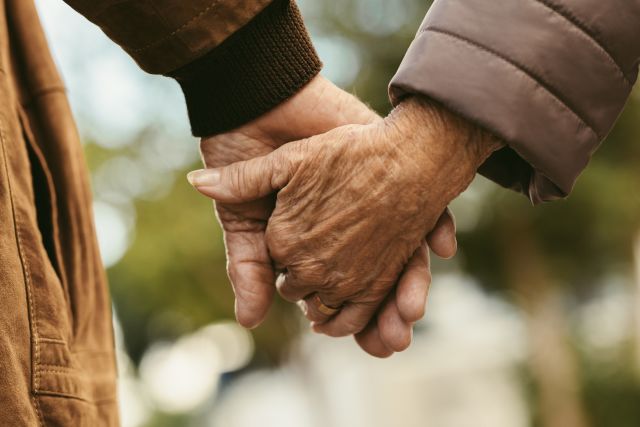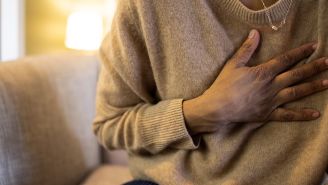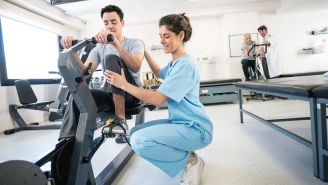Updated on September 20, 2024.
If you have had a heart attack, you probably asked your healthcare provider (HCP) smart questions about eating right and working out. But there’s one topic that you may have brushed over or been too shy to raise: when it’s safe to have sex. And you’re not alone. Many people don’t work up the nerve to ask about sex after a heart attack, and many HCPs fail to bring it up.
Lots of couples are nervous in the bedroom after one of them has had a heart attack. You or your partner might be afraid of making your condition worse or even causing another attack.
Don’t let hesitation or fear stand in the way of your feeling like yourself again. A satisfying sex life can improve your emotional and physical health and be an important part of your recovery.
The case for speaking up
You can’t just Google “When is it safe to start having sex again?” Every recovery is unique, so the answer will depend on factors like which medicines you’re taking and how severe your heart attack was.
It’s important to speak with your HCP first. They can let you know it's okay to resume and give you recommendations tailored to your situation. But generally speaking, it is reasonable to resume having sex a week or two following an uncomplicated heart attack, or six to eight weeks after open-heart surgery, according to the American Heart Association.
One way to help your HCP determine if you’re ready to resume sex—after you’ve received their okay to resume mild-to-moderate exercise—is if you can exercise comfortably without chest pain, shortness of breath, or fatigue.
These exercises may include:
- Climbing one or two flights of stairs at a brisk pace
- Walking briskly for 10 to 20 minutes
Check in with your HCP before you start. They may want to check your heart with a stress test or other measures, just to be sure.
Overcome your sex fears
Heart-attack survivors who have no symptoms, or who pass a stress test, or had the heart’s blood vessels treated to open them up completely are at low risk for another heart attack during sex. Still, life after a heart attack can be complicated.
It’s common to feel anxious or depressed or to go through changes in your relationship, all of which can affect your sex life. Working with a therapist who’s trained in sexual counseling can help you and your partner face those challenges together.
A counselor can:
- Answer tough questions about both the physical and emotional sides of sex. For example, how does a person navigate being both a caregiver and a sexual partner to a spouse?
- Encourage you to discuss sensitive topics
- Help you to communicate about problems you may have been ignoring for years
Be careful with those little blue pills
One of the pitfalls that may crop up post-heart-attack involves medication errors.
After a heart attack, many people take nitrates. These may include:
- Nitroglycerin
- Isosorbide dinitrate
- Isosorbide mononitrate
Nitrates help with chest pain by opening up your blood vessels so blood can flow to your heart more easily. But if you’re taking nitrates, don’t use erectile dysfunction meds without talking to your HCP first about if and/or when you can take them. The combination can cause a deadly drop in blood pressure. Drugs to control atrial fibrillation or blood pressure can also be unsafe to take with erectile dysfunction medications.
Many heart medicines can cause erectile dysfunction or vaginal dryness as well. But if a medication is putting a damper on your sex life, don’t stop it cold turkey. Instead, ask your HCP about trying a similar medicine with fewer side effects. There are usually other options in the same drug family and it may just be a matter of finding the best one for you.
Start with stress-free sex
As you ease back into intimacy, move at a relaxed pace. Choose a familiar place like your own bed, make sure the room is at a comfortable temperature, and ask your partner to take it slow. When you’re ready for action, keep these pointers in mind:
- During missionary position, consider being the person on bottom, since that is less strenuous.
- If you had surgery, don’t put pressure on your wound.
- Avoid anal sex. It puts pressure on the vagal nerve, which connects your gut and your heart. Straining that nerve can cause a drop in heart rate, fainting, and chest pain.
- Orgasm might be difficult. Remember it’s okay to enjoy sex without orgasm.
- If you have chest pain, dizziness, nausea, or trouble breathing, stop what you’re doing and call 911.
Be patient with yourself
Returning to a full and satisfying sex life may take time and require some uncomfortably honest conversations with your partner. But staying open with each other and being frank with your HCP about sex can make the process easier.







